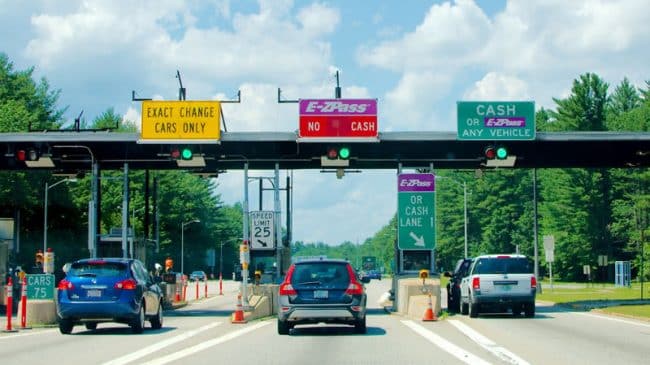In April the conservative magazine The Weekly Standard published a five-page cover story called “HOT and Bothered,” which characterized the express toll lanes project on the Capital Beltway (I-495) as “another nightmare from the suburbs-hating traffic planners.” The article grossly misrepresented how this Fluor/Transurban toll concession project came about, and also attacked the principle of express toll lanes as horribly elitist: the cover illustration showed an overhead sign separating traffic into “Express Lanes” and “Riff-Raff.”
You might think a conservative magazine would favor ideas like market pricing and infrastructure privatization-but not in this case. Author Jonathan Last portrayed the concession as an example of “crony capitalism,” completely misunderstanding how Virginia’s Public Private Transportation Act works. He characterized the deal as yielding “privatized profits and socialized losses,” ignoring the shift of both construction cost risk and traffic & revenue risk to the concession company. And he claimed that most of the money invested in the project was from “taxpayers,” not the private sector, by counting only the equity investment as private-even though Fluor/Transurban is fully at risk for debt service on the private activity bonds and a Transportation Infrastructure Finance and Innovation Act (TIFIA) loan.
Where do these ideas come from? I’ve been researching this subject for a chapter in my forthcoming book on 21st Century Highways. My research has found a growing network of grass-roots, right-wing populist groups opposing tolling and public-private partnership (P3) concessions. One of the originators of many bogus arguments on these subjects is a San Antonio housewife, Terri Hall, founder of the group TURF (Texans United for Reform and Freedom). Her efforts helped bring about a two-year moratorium on concessions in Texas in 2007. This year she led a successful effort to change the platform of the Texas GOP from pro-tolls to anti-tolls. And her anti-tolls, anti-P3 agitation appears to have swayed GOP gubernatorial candidate Greg Abbott (the likely successor to pro-tolls Rick Perry) to adopt anti-toll positions.
But Terri Hall’s grass-roots activism has consequences far beyond Texas. Similar right-wing populist groups are actively opposing P3s and tolling in Florida, Georgia, and North Carolina. Each is also led by a crusading housewife, and their websites use many of the same terms (toll-tax, crony capitalism), arguments (abridging state sovereignty, most of the funding is from taxpayers, etc.) and materials (such as the video “Truth Be Tolled”). When Georgia Gov. Nathan Deal terminated in mid-procurement the P3 concession for Atlanta’s West by Northwest express toll lanes project, it was the state sovereignty issue that he cited. The North Carolina group (whose website is called P3times.com) campaigned hard against the I-77 express toll lanes project, fortunately without succeeding.
The right-wing populists in Florida have failed to dent this state’s steady progress with tolling and concessions, but their current effort is attempting to derail All Aboard Florida. AAF is a private-sector project under which a new division of the company that owns the profitable Florida East Coast (FEC) freight railroad plans to upgrade its tracks and bridges to provide express passenger train service from Miami to Orlando, with stops at Fort Lauderdale and West Palm Beach. Several factors make this project far more viable than the government-funded high-speed rail projects around the country, but that has not deterred the populists from attacking it as a “taxpayer-subsidized” boondoggle. They attack AAF’s pending application for a loan from the Federal Railroad Administration (under its Railroad Rehabilitation and Improvement Financing [RRIF] program, which is somewhat like TIFIA) and claim that Florida DOT’s recent grant to Orlando International Airport for its long-planned intermodal transportation center (which will also serve as AAF’s Orlando station) is a state subsidy to AAF. Some of them have also invented a conspiracy theory under which AAF and FEC’s parent company “owns” the container ships that South Florida ports are gearing up to serve via near-dock rail being installed by FEC. They seem to think that AAF’s request for the RRIF loan is a Trojan Horse to get federal money to upgrade FEC’s freight trackage, which is nonsense since upgrading freight trackage is already eligible for RRIF loans. The anti-AAF groups have caused many to question whether the project will go forward.
My point in presenting this brief summary is that the P3 community cannot afford to ignore the arguments made by these kinds of groups. The Internet makes it easy for their ideas to spread from one group to another, to be re-packaged and tailored to local circumstances. And that also increases the odds that mis-informed or malicious arguments will get picked up and spread by commentators who know little or nothing about tolling or P3 concessions. In the several years of controversy over the long-term concession leases of the Chicago Skyway and Indiana Toll Road, CNN’s Lou Dobbs attacked “foreign companies buying up our highways.” Conservatives, such as Michelle Malkin and Phyllis Schlafly, have also opposed tolling and P3s on various right-wing populist grounds.
It is tempting but foolhardy to dismiss these people’s arguments because, to us, they are so obviously wrong. But to ordinary citizens unfamiliar with either P3s or 21st century all-electronic tolling-let alone legislators and governors-populist terms such as “toll-tax” and “crony capitalism” may very well resonate. Companies with a direct stake in getting a project approved may not be the best messengers for refuting populist arguments, though they should certainly engage in editorial briefings and the like to explain their case and debunk the critics. Public policy think tanks and industry groups like The Association for the Improvement of American Infrastructure (AIAI) and The American Road and Transportation Builders Association (ARTBA) are better messengers for explaining the overall case for tolling and P3 concessions and debunking the populist propaganda.
We need to take populist opposition seriously, rather than ignoring it. It’s essential to analyze and refute bogus arguments against tolling and P3s. Failure to do so could lead to major setbacks for these critically important policies.
Robert Poole is director of transportation at Reason Foundation. This column first appeared in Public Works Financing.

